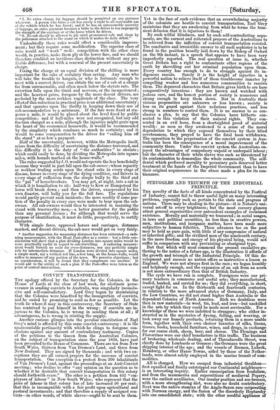CONVICT TRANSPORTATION.
Tire apology offered by the Secretary for the Colonies, in the House of Lords at the close of last week, for obstinate perse- verance in sending convicts to Australia, was singularly inconclu- sive and self-contradictory. Lord Grey began by maintaining that the Colonies were benefited by the immigration of convicts, and he ended by promising to send as few as possible. Let the truth lie where it may in this controversy, the Secretary of State has contrived to put himself in the wrong : if convicts are in- jurious to the Colonies, he is wrong in sending them at all ; if advantageous, he is wrong in stinting the supply. Another curious glimpse into the peculiar constitution of Earl Grey's mind is afforded by this same convict controversy : it is the unaccountable pertinacity with which he clings to foregone con- clusions against any amount of contradictory testimony. Copies of the petitions to the Queen from the Australian Colonies, on the subject of transportation since the year 1838, have just been presented to the House of Commons. There are ten from New South Wales, thirteen from Van Diemen's Land, and three from New Zealand. They are signed by thousands ; and with two ex- ceptions they are all earnest prayers for the surcease of convict transportation. One exception is a protest from 390 inhabitants of Van Diemen's Land, against the proceedings at an Anti-Convict meeting; who decline to offer "any opinion on the question as to whether it be desirable that convict transportation to this colony should forthwith cease." The other is a petition from 452 " em- ployers of labour " in New South Wales ; who represent that the
price of labour in that colony has of late increased 50 per cent ; that this is incompatible with a fair profit upon agricultural and pastoral investments; and that therefore a supply of assigned con- victs—in other words, of white slaves—ought to be sent to them. Yet in the face of such evidence that an overwhelming majority of the colonists are hostile to convict transportation, Earl Grey maintains that they are awakening from what he terms the tran- sient delusion that it is injurious to them! By such wilful blindness, and by such self-contradicting argu- ments, are the earnest and reiterated prayers of the Australians to be relieved from the infliction of convict transportation resisted. The conclusive and irresistible answer to all such sophistry is to be found in the position broadly laid down by the Bishop of Oxford on the 9th instant, in a speech that appears to have been very imperfectly reported. The real question at issue is, whether Great Britain has a right to contaminate other regions of the earth by shovelling out her criminal population upon them. Every country has enough to do to struggle against its in-
digenous rascals. Surely it is the height of injustice in a powerful nation to relieve itself of those troublesome inmates by compelling weaker and less numerous communities to receive them. The depraved characters that Britain gives birth to are here comparatively innoxious : they are known and watched with jealous care, and the honest portion of society is numerous and strong enough to keep them down. But in Australia their vicious propensities are unknown or less known ; society is less on its guard against their nefarious practices, and less strong in numbers to control them. It is no answer to so con- clusive a plea, to say that the Colonies have hitherto con- sented to this violation of their natural rights. They con- sented in an evil hour, from a shortsighted greed of material wealth : as soon as they awakened to a sense of the moral degradation to which they exposed themselves by their blind covetousness, they prayed to have the fatal boon withdrawn. The opposition to the perpetuation of the convict system in Aus- tralia has been the consequence of a moral improvement of the community there. Under the convict system the Australians en- joyed the advantages of compulsory unpaid or underpaid labour; but the character of their white slaves was such as threatened by its contamination to demoralize the whole community. The self- denial which preferred morality to pecuniary gain deserved better treatment at the hands of the Imperial Government than to have their original acquiescence in the abuse made a plea for its con- tinuance.


























 Previous page
Previous page